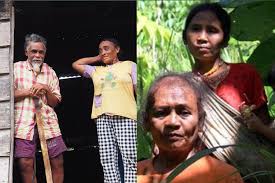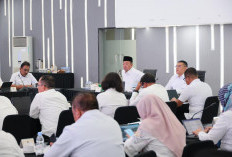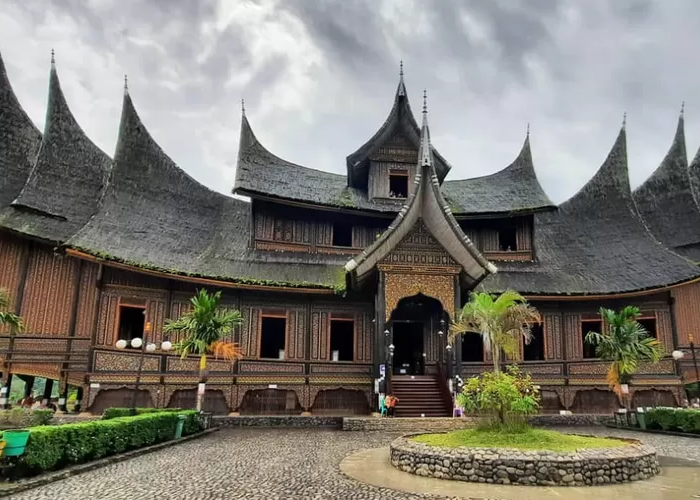Genetic Mysteries of Suku Polahi, Analyzing the Surprising Lack of Genetic Defects

Genetic Mysteries of Suku Polahi, Analyzing the Surprising Lack of Genetic Defects--
PAGARALAMPOS.COM - Tradition has an important role in maintaining social sustainability and stability in a community.
Traditions play a key role in maintaining collective identity, passing on cultural knowledge and skills.
As well as Traditions can strengthen social ties and relationships between community members.
In addition, traditions can also provide a sense of stability and certainty in everyday life.
BACA JUGA:Kerajaan Kuno Jawa Tinggalkan Istana di Hutan, Ternyata Begini Kemegahannya
I really don't know how to respond to the tradition of incest marriage belonging to one of the tribes in Indonesia, which was shocking.
The name of the tribe that carries out the inbreeding tradition is the Polahi Tribe.
Well, this Polahi tribe lives in the interior forest of Gorontalo which is very isolated from other settlements.
So that you are not curious, let's find out more about what the Polahi tribe's inbreeding tradition actually looks like, which has been summarized from various sources in the article below.
BACA JUGA:Legenda dan Keindahan Gunung Merbabu, Kisah Kyai Bakuh dan Asal Usulnya
Ethnic groups in Indonesia have diverse and unique cultures.
One of them is the Polahi tribe, an isolated tribe that lives in the interior of the Gorontalo forest.
The Polahi people are believed to be former refugees who evaded Dutch colonization by making the forest their homeland until today.
According to the story circulating in the community, Polahi is a group of people from Gorontalo who sought refuge in the forest during the 17th century to avoid colonization and paying taxes to the Dutch colonizers.
BACA JUGA:Legenda dan Keindahan Gunung Merbabu, Kisah Kyai Bakuh dan Asal Usulnya
To this day, this tribe still lives within the forests of Boliyohuto, Paguyaman, and Suwawa in the Gorontalo Province.
In the Gorontalo language dictionary, the word "Polahi" is derived from "Lahi-lahi," which means "fleeing" or "in hiding."
This reflects the status of the Polahi tribe at the time—they fled from social interactions and lived in the forest, particularly on the slopes of Mount Boliyohuto in the North Tammaila village, Tolangohula district, Gorontalo regency.
According to historical records, the Polahi tribe is actually a part of the Gorontalo tribe that sought refuge in the forest because their rulers during the Dutch colonization did not want to be oppressed by the colonizers.
BACA JUGA:Dari Gunung Padang Hingga Pulau Nias, Inilah 4 Pesona Situs Megalitikum Terbesar dalam Sejarah Indonesia!
As a result, the Gorontalo people referred to them as Polahi, which literally means "escapees."
This situation affected the Polahi tribe's way of life in the forest.
Even though Indonesia has gained independence, some descendants of the Polahi tribe still choose to live in the forest.
Their anti-colonial stance has been passed down through generations, causing the Polahi people to view outsiders as oppressors and colonizers.
BACA JUGA:Dari Gunung Padang Hingga Pulau Nias, Inilah 4 Pesona Situs Megalitikum Terbesar dalam Sejarah Indonesia!
What makes the Polahi tribe even more unique is the continuation of the tradition of incestuous marriage within their culture.
Unlike the common marriage system where two individuals from different families marry without any blood relations, the Polahi tribe practices a culture of incestuous marriage or a system of inbreeding.
Incestuous marriage within the Polahi tribe allows family members to marry other family members who share blood relations, such as between a mother and a son, father and daughter, or between siblings.
This practice has been in place since the Dutch colonial era and is still practiced today, even though it is considered unusual or even strange by mainstream culture.
BACA JUGA:Tradisi Indonesia Yang Beda Dari Yang Lain! Bahkan Ada Berhubungan Dengan Dukun
Incestuous marriage within the tribe is not based on customary practices, but rather due to their lack of understanding and knowledge of interactions outside their own group.
Members of the Polahi tribe have limited genetic knowledge, leading them to engage in incestuous marriage without realizing the genetic risks that could affect their offspring's health.
In the field of health and research, incestuous marriage can increase the risk of genetic disorders or defects in offspring.
Children born from incestuous marriages tend to have minimal genetic diversity, which can elevate the likelihood of rare genetic diseases or defects.
BACA JUGA:Tradisi Indonesia Yang Beda Dari Yang Lain! Bahkan Ada Berhubungan Dengan Dukun
However, in the case of the Polahi tribe, there is a surprising uniqueness. Despite practicing incestuous marriage, there have been no cases of offspring born with defects.
All members of the Polahi tribe appear genetically normal.
This phenomenon is intriguing, as it differs from the situation in other countries where genetic abnormalities are much higher in cases of incestuous marriage.
This phenomenon indicates the presence of factors that are not yet fully understood regarding the genetic uniqueness of the Polahi tribe.
BACA JUGA:Penemuan Logam Mulia Dan Artefak Kuno Berlanjut, Sejarah dan Misteri Gunung Padang Akan Diungkap!
As such, this short account of the Polahi tribe not only adds to our knowledge of Indonesia's ethnic diversity, but also emphasizes the importance of genetic understanding and knowledge when considering marriage practices within a society.
The cultural uniqueness of the Polahi tribe serves as a testament to the captivating diversity in this nation.

Tradisi memiliki peran penting dalam menjaga keberlanjutan dan kestabilan sosial dalam suatu komunitas.
Tradisi memainkan peran kunci dalam memelihara identitas kolektif, mewariskan pengetahuan dan keahlian budaya.
BACA JUGA:Inilah 4 Fakta dan Alasan Menarik di Balik Perkawinan Sedarah Suku Polahi di Gorontalo
Serta Tradisi dapat memperkuat ikatan sosial dan hubungan antar anggota komunitas.
Selain itu, tradisi juga dapat memberikan rasa stabilitas dan kepastian dalam kehidupan sehari-hari.
Sungguh tidak tahu bagaimana menanggapi tradisi perkawinan sedarah milik salahsatu suku yang ada di indonesia ini sempat mengegerkan.
Nama suku yang melaksanakan tradisi perkawinan sedarah tersebut adalah Suku Polahi.
BACA JUGA:Legenda dan Keindahan Gunung Merbabu, Kisah Kyai Bakuh dan Asal Usulnya
Nah, suku polahi ini tiggal di dalam hutan pedalaman gorontalo yang sangat terpendil dari permukiman lainnya.
Biar tidak penasaran, Yuk ketahui lebih dalam seperti apa sih sebenarnya tradisi perkawinan sedarah milik suku polahi ini yang telah dirangkum dari berbagai sumber di dalam artikel dibawah ini.
Suku bangsa di Indonesia memiliki budaya yang beragam dan unik.
Salah satunya adalah suku Polahi, suku terasing yang hidup di pedalaman hutan Gorontalo.
BACA JUGA:Situs Tetegewo dan Feta Batu, Harmoni Antara Sejarah dan Seni di Nias, Alat Musik Zaman Batu?
Cek Berita dan Artikel lainnya di Google News
Sumber:


























